12 what did you do last weekend Section B 课件
最新七年级英语下册 Unit 12 What did you do last weekend(Section A 1a-2d)教案
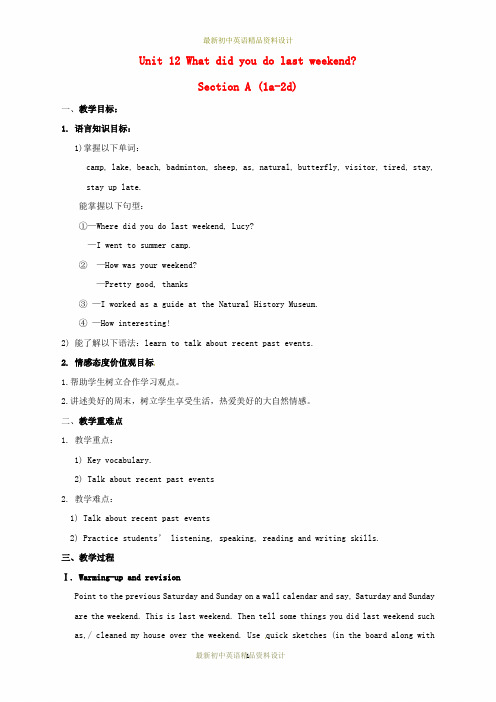
Unit 12 What did you do last weekend?Section A (1a-2d)一、教学目标:1. 语言知识目标:1)掌握以下单词:camp, lake, beach, badminton, sheep, as, natural, butterfly, visitor, tired, stay, stay up late.能掌握以下句型:①—Where did you do last weekend, Lucy?—I went to summer camp.②—How was your weekend?—Pretty good, thanks③—I worked as a guide at the Natural History Museum.④—How interesting!2) 能了解以下语法:learn to talk about recent past events.2. 情感态度价值观目标1.帮助学生树立合作学习观点。
2.讲述美好的周末,树立学生享受生活,热爱美好的大自然情感。
二、教学重难点1. 教学重点:1) Key vocabulary.2) Talk about recent past events2. 教学难点:1) Talk about recent past events2) Practice students’ listening, speaking, reading and writing skills.三、教学过程Ⅰ. Warming-up and revisionPoint to the previous Saturday and Sunday on a wall calendar and say, Saturday and Sunday are the weekend. This is last weekend. Then tell some things you did last weekend such as,/ cleaned my house over the weekend. Use quick sketches (in the board along withgestures to demonstrate the meaning of each activity,Ⅱ. 1 a This activity introduces the key vocabulary.Focus attention on the picture. Ask students to tell what they see. Name each activity and ask students to repeat: did my homework, went to the cinema, went boating, camped by the lake, went to the beach, played badminton.Point out the numbered list of activities. Say each one again and ask students to repeat.Then ask students to match each activity with one of the pictures. Say, Write the letter of each activity next to the words. Point out the sample answer.Check the answers.Ⅲ. ListeningWork on 1bThis activity gives students practice in understanding the target language in spoken conversation.Point to the activities in the picture in activit y la. Ask students to tell what the person did in each picture. For example, She played badminton, or Lucy went to the ci nema. Play the recording the first time. Students only listen.Play the recording a second time. This time say. Listen to the recording and write the days and times Lucy did each thing under the pictures. Point out the sample answer under the picture of Lucy playing badminton; on Saturday morning.Correct the answers.Ⅳ. PairworkWork on 1cThis activity provides guided oral practice using the target language.Point to the example conversation. As k two students to read the dialogue to the class.Say, Now work with a partner. Student A, pretend to be Lucy. Student B, ask questions about what Lucy did on different days and times over the weekend. Talk about the activities in the picture.Students work in pairs. As they talk, move arou nd the room monitoring their work. Offer language or pronunciation support as needed,Ⅴ. ListeningWork on 2a:This activity gives students practice in understanding the key vocabulary in spoken conversation.Point to the five sentences and ask a student to read these sentences to the class.Say, You will hear recording of a conversation. The people will talk about some of the activities and people, but they will not talk about others. Please underline the words you hear on the recording.Play the recording the first time. Students only listen.Play the recording a second time. This time, ask students to underline each word that is said on the tap e. Point out the sample answer, grandmother.Correct the answers.1grandma 2 homework 3 English 4 farm 5 cowsⅥ. ListeningWork on 2b:This activity provides listening practice using the target language.Call attention to the pictures of Carol, Becky, and Jack and ask students to identify each person by name.Say, Now I will play the recording again. Listen to the students talking about what they did over the weekend. Write C for Carol, B for B Becky or J for Jack next to each statement in activity 2a. The first one has been done for you.Play the recording the first time. Students only listen.Point out the sample answer, S, in statement 1. Say, Sonia visited her grandmother.Play the recording again. Ask students to write a letter in front of each statement to show what each person did.Check the answers. B B C J JⅦ. Pair workAsk and ans wer in pairs.Point to the example conversation. Ask two students to read the dialogue to the class.Say, Now work with a partner. Student A, ask questions about what, who or where , StudentB answers. Students work in pairs.Ⅷ. Role-play the conversation.1. Ask Ss to look at conversation in 2d. Then Ss read the dialogue by themselves andfind the answer to these questions:① What did Lisa do on her weekend?② What did Paul do on his weekend?2. Ss work in pairs and role-play the conversations.3. Have several pairs perform their conversations for the rest of the class. Homework:1. Copy new words twice.2. Write about what you did last weekend.板书设计:Section A (1a-2d)—Where did you do last weekend, Lucy?—I went to summer camp.—How was your weekend?---Pretty good, thanks—I worked as a guide at the Natural History Museum.—How interesting!。
Unit 12 What did you do last weekend Section A(1a-2d)教学设计

Teaching Plan for Lesson 1,Unit12 What did you do last weekend? J1BT e a c h i n g O b j e c t i v e s1. Learn and practice the verb phrases expressing what people did last weekend(e.g., did my homework, went to the cinema, went boating , camped by the lake, went to the beach, played badminton, etc.).2. Learn and practice the sentence patterns:What did … do last weekend? I/Bob/Lucy/He/She/they played badminton / went to the cinema…. a nd use them to talk about the past events and describe what they did last weekend.3. Listen to the conversations and fill in the blanks with “morning” “afternoon” or “night”.4. Practice talking about what each student did last weekend in pairs.5. Be aware that learning English is not just listening to the teacher about the words or grammar but also using the words & grammar rules to understand what people say or to express their ideas in real life. Teaching ProcedureStage1: Leading-in and introduction of the new unitStep 1: T greets Ss and introduces the topic of the new unit by questions (asking them about the trips and what they did last weekend).T: How was your trip last week? What did you do? Please guess whathe/she did.Step 2: T informs Ss of the main learning task of the lesson: how to talk about what people did last weekend.Stage 2: Presentation and practice of the new languageStep 1: T shows Ss a pack of pictures and tells Ss that they will find out what the students in the pictures did last weekend.Step 2: T takes out a picture of a girl thinking about her playing badminton and asks some questions like What did the girl do? Who played with her? etc. T presents the sentences on Bb (Bb: What did she do? She played badminton.).Step 3: T presents the other phrases and sentences with pictures in the same way. (Sequence: did my homework, went to the cinema/zoo, went boating , camped by the lake, went to the beach, climbed a mountain, etc) Step 4: Ss read out loud the sentences after T.Step 5: Practice with the pictures: (1) T asks questions about the pictures and Ss answer in concert. (2) Ss practice between groups and between boys and girls and other similar ways. (3) T asks the individual student to act out.Stage 3: Matching.Step1: Ss match the activities with the pictures individually. The whole class checks the answer with the T.Stage 4: Listening to the conversationsStep 1: T introduces the listening task to Ss: listen to the tape and fill in the blanks with “morning” “afternoon” or “night”.Step2: Ss make clear of “morning” “afternoon” or “night” before listening.Step 3: Ss listen and fill in the blanks with “morning” “afternoon” or “night” with what Lucy did last weekend.Step 4: Ss listen again and checks answers.Step 5: Ss read aloud the tape scripts after the tape. T corrects their pronunciation and intonation when necessary.Step 6: Ss ask and answer about Lucy in 1a pictures in pairs.S t a g e5:T a l k i n g a b o u t o u r weekendsS t e p1:P a i r w o r k:S s a s k a n d a n s w e r a b o u t what they did last weekend(T r e m i n d s S s t h a t t h e y m a y u s e t h e c o n v e r s a t i o n s i n1b a s r e f e r e n c e.S t e p2:V o l u n t e e r p a i r s s a y o u t l o u d t h e i r d i a l o g u e s i n c l a s s a n d T a s k s o t h e r S s a b o u t t h e d i a l o g u e a n d t o c h e c k a n d r e v i s e t h e i r l a n g u a g e.What did the girl/you/… do?...Who played with her/his/you/ …?...S t a g e6:S u m m a r y a n d h o m e w o r k.S t e p1:T g u i d e s S s t o s u m m a r i z e t h e v e r b p h r a s e s i n t h r e e g r o u p s:did my homework, went to the cinema/zoo, went boating, camped by the lake, went to the beach, climbed a mountain,v i s i t e d a m u s e u m.A n d T r e m i n d s S s o f t h e d i f f e r e n c e b e t w e e n p a s t t e n s e a n d p r e s e n t t e n s e.S t e p2:S s r e a d a l o u d t h e n e w w o r d s,t h e p h r a s e s a n d t h e s e n t e n c e st o g e t h e r a n d d o s o m e t r a n s l a t i o n p r a c t i c e.S t e p3:H o m e w o r k:w r i t e d o w n t h e d i a l o g u e t h e y m a k e i n c l a s s a n d r e v i e w S e c t i o n A2a-2d.2013.04.10。
精心整理最新版人教版英语Unit 12 What did you do last weekend sectionB

studied for a test flew a kite went to the had dinner library with friends
Make a conversation with a partner. 1d Talk about what Sally and Jim did last weekend.
weekend? They went to a small village in India. 3. How did Lisa feel when she saw the snake? She was so scared that she couldn’t move.
4. What did Lisa and her sister do? They shouted to their parents. 5. What did their parents do? Why did they do that?
Her father jumped up and down to scare the snake.
6. What lesson did Lisa learn from the weekend? Don’t go near snakes./ Snakes can’t hear but they can feel movements.
Unit 12
What did you do last weekend?
Section B (2a-2c)
2a What kind of animals are people sometimes afraid of ? Why? Make a list.
crocodile ['krɒkədail] 鳄鱼
tiger 老虎
新教材七年级英语下册Unit12 what did you do last weekend Section A课件

What did you do on Saturday afternoon?
I went to the beach.
Listen and underline 2a the words you hear. 1. I visited my (aunt / ________ grandma). _________ / sports). 2. I did my (homework 3. I studied for the (English _______ / math) test. 4. I went to a (farm _____/ beach). 5. I fed some (sheep / _____ cows).
natural museum nature
A: What ____Becky did ___last do Saturday morning? B: She_______ visited her grandma. Did A: ____she _____her aunt on Sunday afternoon ? visit B:___,________. No she didn’t
visite (one’s )aunt
visite (one’s) grandma A: Who visited ______her grandma? B: Becky______. did
A: Where ____she did ____on go Sunday morning? stayed at B: She _________home . A: Did she_______________________ study for the English test . B:____,________________________. No she studied for the math test
unit12_What_did_you_do_last_weekend_Section_A_2 新目标初一英语下册
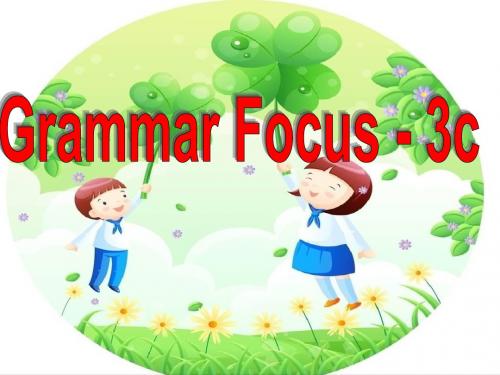
Where did you go on Dragon Boat Day?
点此播放对话视频
What did you do there?
I went to the countryside.
I watched the boat race.
What did you do last weekend?
点此播放对话视频
阅读Grammar Focus部分,完成
下列句子。 1. 上个周末你做什么了? What did you do last weekend? ___________________________ 2. 我做了我的家庭作业。 I did my __________________ homework.
点此播放听力视频
We went boating. 3. 我们去划船了。_______________
4. 谁去探望了她的奶奶? _______________________ Who visited her Becky did. 5. grandma? 是蓓基?_________ 6. 上个周末她去了哪里? Where did she go last ___________________________ weekend?
1. mouse ຫໍສະໝຸດ 为“老鼠”,复数形式 为“mice”。
他们看到了两只老鼠。
They saw two mice.
2. language 意为“语言”,是可数名词。
英语、汉语、法语是三种不同的语言。
English, Chinese and French are three
different languages.
此类填空题,应主要根据答语的意思
来确定问句中所缺的特殊疑问词是什
unit12_What_did_you_do_last_weekend_Section_B2

Her dad started to jump up and down in their tent. This woke the snake up and it moved into the forest near the lake.
Her dad told her later that snakes don’t have ears but they can feel things moving. He also told her it was important not to go near a snake. This was a very useful lesson for her.
The first night, they
just sat under the moon and told each stories. But Lisa was so tired that she went to sleep early.
The next morning,
Lisa and her sister got a
A: We watched the firefighters worked.
What an interesting job they have! Did you learn anything (learn B: ______________________ anything)?
A: Sure. We learned how to call the fire
station and what to do when there is
a fire.
一、单项选择
1. The snake moved _____ C the forest slowly.
人教新目标英语七年级下册unit 12《what did you do last weekend》section a 1a-2d教案.doc

Unit 12 What did you do last weekend?Section A (1a-2d)一、教学目标:1. 语言知识目标:1)掌握以下单词:camp, lake, beach, badminton, sheep, as, natural, butterfly, visitor, tired, stay, stay up late.能掌握以下句型:①—Where did you do last weekend, Lucy?—I went to summer camp.②—How was your weekend?—Pretty good, thanks③—I worked as a guide at the Natural History Museum.④—How interesting!2) 能了解以下语法:learn to talk about recent past events.2. 情感态度价值观目标1.帮助学生树立合作学习观点。
2.讲述美好的周末,树立学生享受生活,热爱美好的大自然情感。
二、教学重难点1. 教学重点:1) Key vocabulary.2) Talk about recent past events2. 教学难点:1) Talk about recent past events2) Practice students’ listening, speaking, reading and writing skills.三、教学过程Ⅰ. Warming-up and revisionPoint to the previous Saturday and Sunday on a wall calendar and say, Saturday and Sunday are the weekend. This is last weekend. Then tell some things you did last weekend such as,/ cleaned my house over the weekend. Use quick sketches (in the board along with gestures to demonstrate the meaning of each activity,Ⅱ. 1 a This activity introduces the key vocabulary.Focus attention on the picture. Ask students to tell what they see.Name each activity and ask students to repeat: did my homework, went to the cinema, went boating, camped by the lake, went to the beach, played badminton.Point out the numbered list of activities. Say each one again and ask students to repeat.Then ask students to match each activity with one of the pictures. Say, Write the letter of each activity next to the words. Point out the sample answer.Check the answers.Ⅲ. ListeningWork on 1bThis activity gives students practice in understanding the target language in spoken conversation.Point to the activities in the picture in activit y la. Ask students to tell what the person did in each picture. For example, She played badminton, or Lucy went to the ci nema. Play the recording the first time. Students only listen.Play the recording a second time. This time say. Listen to the recording and write the days and times Lucy did each thing under the pictures.Point out the sample answer under the picture of Lucy playing badminton;on Saturday morning.Correct the answers.Ⅳ. PairworkWork on 1cThis activity provides guided oral practice using the target language.Point to the example conversation. As k two students to read the dialogue to the class.Say, Now work with a partner. Student A, pretend to be Lucy. Student B, ask questions about what Lucy did on different days and times over the weekend. Talk about the activities in the picture.Students work in pairs. As they talk, move arou nd the room monitoring their work. Offer language or pronunciation support as needed,Ⅴ. ListeningWork on 2a:This activity gives students practice in understanding the key vocabulary in spoken conversation.Point to the five sentences and ask a student to read these sentences to the class.Say, You will hear recording of a conversation. The people will talk about some of the activities and people, but they will not talk about others. Please underline the words you hear on the recording.Play the recording the first time. Students only listen.Play the recording a second time. This time, ask students to underline each word that is said on the tap e. Point out the sample answer, grandmother.Correct the answers.1grandma 2 homework 3 English 4 farm 5 cows Ⅵ. ListeningWork on 2b:This activity provides listening practice using the target language.Call attention to the pictures of Carol, Becky, and Jack and ask students to identify each person by name.Say, Now I will play the recording again. Listen to the students talking about what they did over the weekend. Write C for Carol, B for B Becky or J for Jack next to each statement in activity 2a. The first one has been done for you.Play the recording the first time. Students only listen.Point out the sample answer, S, in statement 1. Say, Sonia visited her grandmother.Play the recording again. Ask students to write a letter in front of each statement to show what each person did.Check the answers. B B C J JⅦ. Pair workAsk and ans wer in pairs.Point to the example conversation. Ask two students to read the dialogue to the class.Say, Now work with a partner. Student A, ask questions about what, who or where , Student B answers. Students work in pairs.Ⅷ. Role-play the conversation.1. Ask Ss to look at conversation in 2d. Then Ss read the dialogue bythemselves and find the answer to these questions:① What did Lisa do on her weekend?② What did Paul do on his weekend?2. Ss work in pairs and role-play the conversations.3. Have several pairs perform their conversations for the rest of the class.Homework:1. Copy new words twice.2. Write about what you did last weekend.板书设计:。
unit12_What_did_you_do_last_weekend_Section_A_2
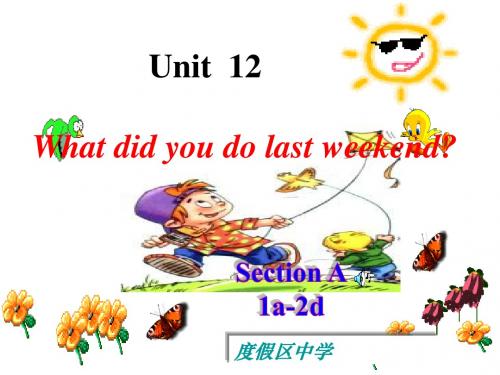
规则动词加-ed的读音
清念 /t/ ,元浊/d/ ;
/t/ /d/ 之后念/id/ Can you read these words? stayed watched cleaned visited
(练习)
practiced
】
★【以不发音e结尾的加-d
比一比,看谁读的准
regular verbs: 规则动词
tired
stay up
2d
Read the conversation and answer
the questions.
1. How was Lisa’s weekend? It was great. ______________________
2. Where did Lisa work as a guide? At the Natural History Museum. _____________________________
3. How interesting! 多么有趣啊! 这是一个感叹句,句子结构为: How + 形容词或副词 + (主语 + 谓 语)!
那本书太有趣了!
How interesting the book is!
3. What did she do there?
_____________________________ She told the visitors about the _____________________________ butterflies and their living habits. 4. Why is Paul tired now? Because he stayed up late to watch _____________________________ the soccer game. _____________________________
人教版七年级英语下册Unit 12 What did you do last weekend Section B 1a-1e教学课件共36张PPT含听力
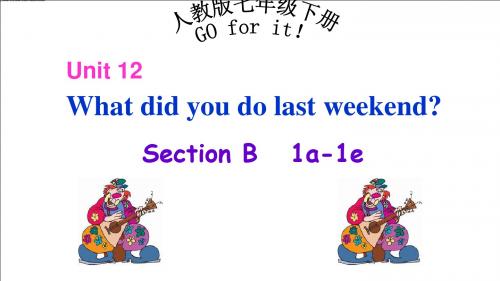
Come here! I have something important to
tell you. 过来!我有一些重要的事要告诉你。
Practise
改错。
Sally wants to do different something
this time.
something different
Exercise
Jim: Well, Is_a_n_g_ and _p_la_y_e_dthe guitar on Saturday morning. On Sunday afternoon, I_f_le_w__a_k_i_t_e_i_n_t_h_e_p__a_rk__. And on Sunday night, I _h_a_d__d_in_n_e_r_ with my friends.
Lily/watch TV last night
–What did she do last night? –she watched TV at home.
On Saturday
IIsIrwewaedmntninetowa tshpweailmpibemrasinr.yg. pool.
on Sunday
Uncle Bob/go fishing
last weekend
–What did Uncle Bob do last weekend? –He went fishing.
they /climb mountains
last year
–What did they do last year?
–They climbed mountains.
Unit 12
What did you do last weekend?
人教版新目标七年级下学期Unit-12--what-did-you-do-last-weekend--知识点

Unit 12 what did you do last weekend?Section A 知识讲解一. last(1)last形容词“最后的,最末的”或者“紧接前面的,刚过去的”。
Today is the last day in the year.最后一天。
I didn’t sleep well last night. 昨晚(2)last副词,“最后地”,I’m the last one.最后一个。
(3)last 动词,“持续,继续,维持”等,The hot weather lasted a week.持续了一周。
二. camp(1)camp 动词,“扎营,搭帐篷”。
We go camping every summer.We walked all day and camped by a river at night.(2)camp 名词,“露营地,度假营”。
Let’s go back to the camp, it’s getting dark. 让我们回营地吧,天黑下来了。
根据汉语提示填空。
(1)When did you join the ______ ______ (夏令营)?(2)I like ______ ______ (去宿营)in the open air.3)We______(宿营)in the forest last night. (4)Let’s go back to the ______(营地)三. sheepsheep 可数名词,“绵羊”,复数还是sheep;goat指山羊。
How many sheep are there on your farm? 你们农场里有多少只羊?拓展:常见的单复数同形的名词还有:deer (鹿),fish (鱼),Chinese (中国人),Japanese(日本人)等。
四. byby介词, “在……旁边”,相当于beside。
Our teacher is sitting by the window.by与交通工具名词连用时,名词前不用冠词,意为“乘、坐、用”等。
Unit 12 What did you do last weekend(Section A (Grammar Focus-3c))教学案(人教新目标七年级下册)
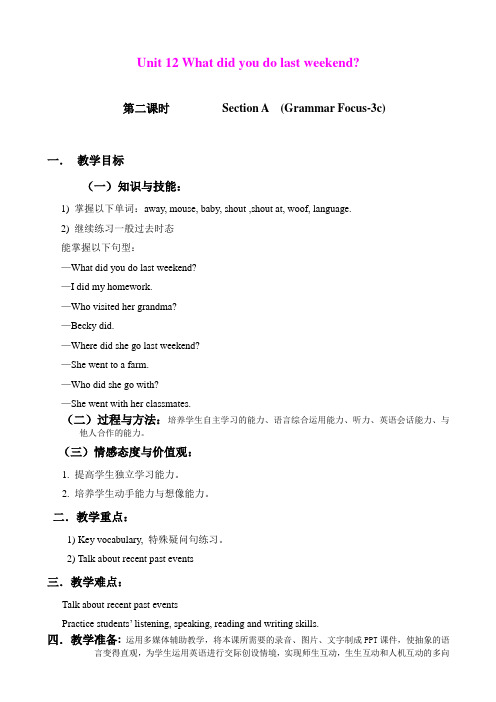
Unit 12 What did you do last weekend?第二课时Section A (Grammar Focus-3c)一.教学目标(一)知识与技能:1) 掌握以下单词:away, mouse, baby, shout ,shout at, woof, language.2) 继续练习一般过去时态能掌握以下句型:—What did you do last weekend?—I did my homework.—Who visited her grandma?—Becky did.—Where did she go last weekend?—She went to a farm.—Who did she go with?—She went with her classmates.(二)过程与方法:培养学生自主学习的能力、语言综合运用能力、听力、英语会话能力、与他人合作的能力。
(三)情感态度与价值观:1. 提高学生独立学习能力。
2. 培养学生动手能力与想像能力。
二.教学重点:1) Key vocabulary, 特殊疑问句练习。
2) Talk about recent past events三.教学难点:Talk about recent past eventsPractice students’ listening, speaking, reading and writing skills.四.教学准备:运用多媒体辅助教学,将本课所需要的录音、图片、文字制成PPT课件,使抽象的语言变得直观,为学生运用英语进行交际创设情境,实现师生互动,生生互动和人机互动的多向交流。
五.教学过程(一).温故互查温故互查学生自学新单词(教材P69的单词),看谁记得又快又准。
(2 分钟)根据首字母或汉语提示完成句子。
1. Do you understand body l ?2. The lovely b is only half a year old.3. There are many m (老鼠) near the old house.4. I (跑开) from home when I was sixteen years old.5. You needn't (大声叫嚷) me.(二).设问导读Ⅰ. Warming- up and revision1. Greet students.2. Check the homeworkⅡ. Grammar Focus.1. 学生阅读Grammar Focus中的句子并完成下列填空题。
人教版英语七年级下册Unit 12听力原文及翻译
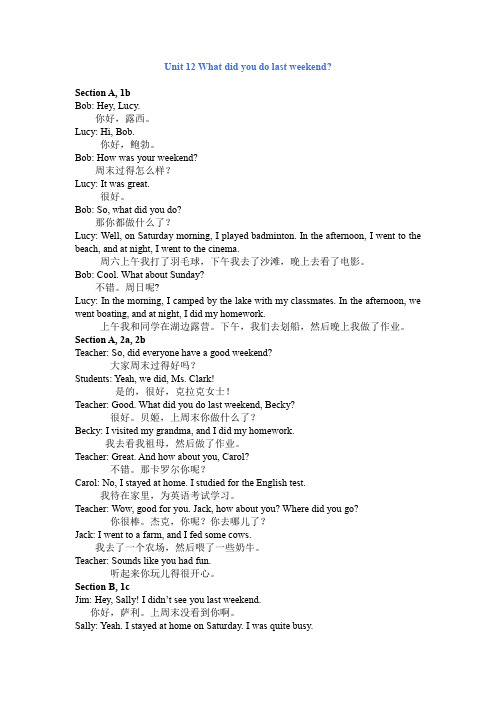
Unit 12 What did you do last weekend?Section A, 1bBob: Hey, Lucy.你好,露西。
Lucy: Hi, Bob.你好,鲍勃。
Bob: How was your weekend?周末过得怎么样?Lucy: It was great.很好。
Bob: So, what did you do?那你都做什么了?Lucy: Well, on Saturday morning, I played badminton. In the afternoon, I went to the beach, and at night, I went to the cinema.周六上午我打了羽毛球,下午我去了沙滩,晚上去看了电影。
Bob: Cool. What about Sunday?不错。
周日呢?Lucy: In the morning, I camped by the lake with my classmates. In the afternoon, we went boating, and at night, I did my homework.上午我和同学在湖边露营。
下午,我们去划船,然后晚上我做了作业。
Section A, 2a, 2bTeacher: So, did everyone have a good weekend?大家周末过得好吗?Students: Yeah, we did, Ms. Clark!是的,很好,克拉克女士!Teacher: Good. What did you do last weekend, Becky?很好。
贝姬,上周末你做什么了?Becky: I visited my grandma, and I did my homework.我去看我祖母,然后做了作业。
Teacher: Great. And how about you, Carol?不错。
初中英语 七年级下册 Unit12 What did you do last weekend
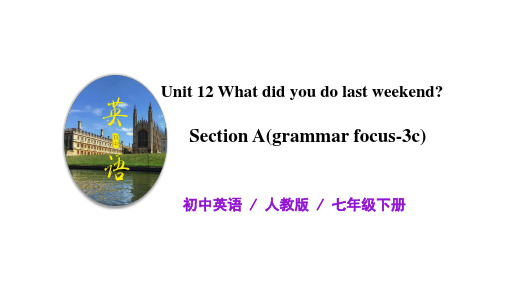
一般过去时的句式转换 1. 肯定句变否定句 (1)当句中含有情态动词 could, would, should
等时,可直接在情态动词后加 not。 You should go to the zoo first. You shouldn’t go to the zoo first.
3b Complete the passage with the correct forms
of the words in the box.
say be climb see run away
A family of mice were in the kitchen on Saturday morning when they __sa_w__ a big cat. Baby Mouse __w__a_s__ afraid and _c_li_m__b_e_d_ onto his father’s back.
(2) ① 昨天他做了什么事情? W__h_a_t_ _d_i_d_ he do yesterday?
② 上个周末她参观了什么地方? W__h_e_r_e_ _d_i_d_ she _v_i_si_t_ last weekend?
③ 你和谁一起去的动物园? _W__h_o_ _d_i_d_ you go to the zoo w__it_h_?
(2) 当句中含有 was/ were 时,可直接在was/ were 后加 not。 She was in the library yesterday. She wasn’t in the library yesterday.
(3)当句中的谓语动词是实义动词时,需在该动 词前加 didn’t,动词还原为原形。 She went to the park last week. She didn’t go to the park last week.
Unit 12 What did you do last weekendSectionB课件

have a picnic
pretty nice
fly kites
summer camp
on vacation visited the museum
1.—Where did you go __o_n__v_a_c_a_ti_o_n__? —I visited my uncle in Shanghai. 2.—Did you __h_a_v_e__a__p_i_c_n_ic__ on the mountain? —Yeah. It was interesting. 3.I like to __f_ly__k_i_te_s__ in spring, and I can make beautiful kites.
(3) 句中的keep us warm意为“使我们暖和”,是“keep+宾语+形容词(使……保持……状态)”结构。例如: He always keeps his room clean. 他总是保持房间干净。 【拓展】 ① “keep+形容词”意为“保持某种状态”。例如:This helps to keep healthy. 这有助于保持身体健 康。 ② keep (on) doing sth.意为“一直做某事”。例如:They kept working all day. 他们整天不停地工作。 ③ keep sb. doing sth.意为“让某人不停地做某事”。例如:Don’t keep me waiting for long. 别让我等太久。
C.put on; have some vegetables yesterday.
D.put up; have
A.buy
B.to buy
( C )(3) It’s so dirty in your room. Please
新目标版英语七年级下册Unit12Whatdidyoudolastweekend?(SectionB)含答案
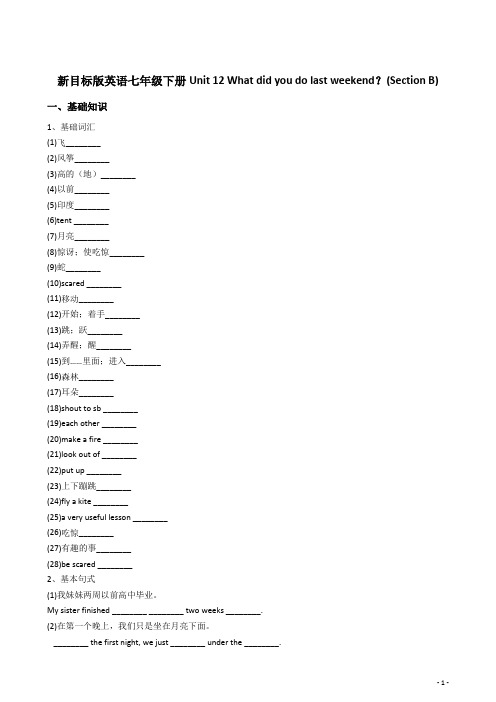
新目标版英语七年级下册Unit 12 What did you do last weekend?(Section B)一、基础知识1、基础词汇(1)飞________(2)风筝________(3)高的(地)________(4)以前________(5)印度________(6)tent ________(7)月亮________(8)惊讶;使吃惊________(9)蛇________(10)scared ________(11)移动________(12)开始;着手________(13)跳;跃________(14)弄醒;醒________(15)到……里面;进入________(16)森林________(17)耳朵________(18)shout to sb ________(19)each other ________(20)make a fire ________(21)look out of ________(22)put up ________(23)上下蹦跳________(24)fly a kite ________(25)a very useful lesson ________(26)吃惊________(27)有趣的事________(28)be scared ________2、基本句式(1)我妹妹两周以前高中毕业。
My sister finished ________ ________ two weeks ________.(2)在第一个晚上,我们只是坐在月亮下面。
________ the first night, we just ________ under the ________.(3)对我来说,这是一个非常有用的教训。
This was a very ________ lesson ________ me.(4)我爸爸开始在他们的帐篷里跳上跳下。
My dad started to ________ ________ ________ ________ ________ their ________.(5)我是如此累,以至于很早就去睡了。
unit12 What did you do last weekendSectionB2a-2c
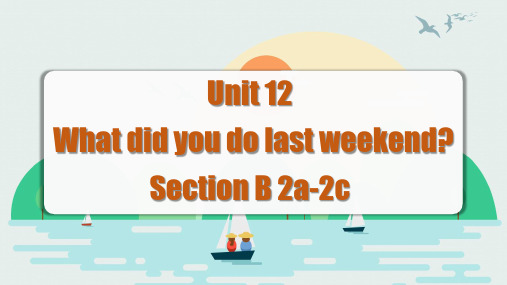
1. Snakes don’t have _e_a_rs__ but can feel things _m_o_v_i_n_g. 2. It was important not to go _n_e_a_r _ a lake.
Let’s read Listen and read.
A Weekend to Remember
danger. My dad started to jump up and down in their tent. This woke the
/ˈɪntuː/ prep. 到 …… 里面;进入
wake/ weɪk/ v. (woke/wəʊk/ ) 弄醒;醒
snake up and it moved into the forest near the lake. My dad told me later
/haɪ/ adj.& adv. 高的(地)high school 中学
My sister finished high school two weeks ago. As a special gift, our parents took us to
/əˈɡəʊ/ adv. 以前
India. Last weekend was interesting but scary.
Let’s read 2b Read paragraph 3 and answer the questions.
the next morning when
near the fire
Lisa was so__sc_a_r_e_d_ that she couldn’t move.
Lisa and her sister got a terrible _s_u_r_p_ri_se_.
七下Unit12 What did u do last week所有知识点

Unit 12 What did you do last weekend?Section (A1a-2d)一、学习目标1. 单词: camp lake beach badminton sheep as natural2. 语言目标:1.–What did you/he/she/they do last weekend ?--I/We/He/She/They went boating2.sb. stay up late to watch the soccer game.二、学习重点、难点用过去时谈论过去发生的事。
三、导学指导1.、预习a. 会读P67-68单词b. 完成1a并将图片匹配c. 词汇翻译1.做了作业_______________2.去了看电影________________3.去了划船_________________4.去了沙滩_______________5.去了湖边露营_______________6.打了羽毛球______________7.打了排球_______________8.为考试而学习了_______________9.喂了些羊______________10.拜访了奶奶_______________2. 知识点播●熟读下列对话,然后进行展示,并要求新编对话,A:–What did you/he/she/they do last weekend ?B:-I/We/He/She/They went boating.●感叹句的三种结构:①How + 形容词/副词+(主+谓)!如:How beautiful she is!她多漂亮呀!②What a/an +形容词+名词单数+(主+谓)!如:What a beautiful girl she is ! 她是一个多么漂亮的姑娘呀!③What + 形容词+名复/不可数名词+(主+谓)!如: What smart boys they are! 多聪明的小家伙!1. ________ a fine day it is!2. ________ nice music it is!3. ________clever the girl is!4. ________ red apple this is5. ________ kind women they are!6. ________hard the worker are working!●动词过去式不规则变化之一:“AA制”即动词原形与动词过去式相同.如:Put→put, cut→cut, let→let, cost→cost, read→read,注意:read写法相同,读音不同。
人教版七年级英语下册Unit 12背记手册 Section

UNIT 12 What did you do last weekend?Section A(1a-3c)重点单词1. ____________ v. 扎营;搭帐篷2. ____________n. 湖;湖泊3. ____________ n. 海滩;沙滩4. ____________n. 羊;绵羊5. ____________ prep. 作为;当作6. ____________adj. 自然的7. ____________ n. 游客;访问者8. ____________adj. 疲倦的;疲劳的9. ____________ v. 停留;待10. ____________adv. 离开;远离11. ____________ n. 老鼠;耗子12. ____________adj. 幼小的n. 婴儿13. ____________ v. 呼叫;喊叫14. ____________n. 语言单词变形1. beach——____________(复数)2. sheep——____________(复数)3. nature——____________(形容词)4. visit——____________(名词)5. mouse——____________(复数)6. run——____________(过去式)重点短语1. ____________做我的作业2. ____________去看电影3. ____________去划船4. ____________在湖边露营5. ____________打羽毛球6. ____________充当7. ____________生活习惯8. ____________深夜不睡;熬夜9. ____________冲……大声叫嚷10. ____________第二语言重点句型1. __?__ 上周末你做什么了?2. __?__ 你的周末怎么样?3. __?__ 谁看望了她的祖母?4. ____________ did she go last weekend? 上周末她去哪里了?5. She went ____________ her classmates. 她和她的同学一起去的。
Unit 12 What did you do last weekend?Section A 1-
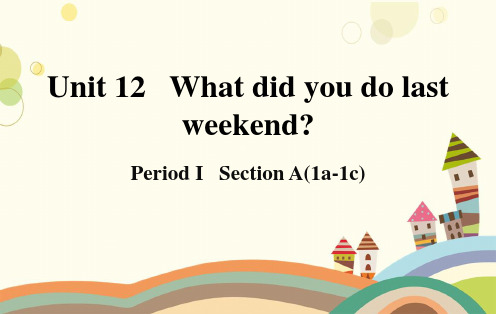
st weekend意为上周末,作时间状语,是一般 过去时的标志。
3.on Saturday morning为介词短语,意为在星期六 上午。
on是介词,用在确定的星期、某一天或者某一天 的上午,下午,或者晚上。
小小翻译家
翻译下列短语。
1. did my homework 2. went to the cinema 3. went boating 4. camped by the lake 5. went to the beach 6. played badminton
1c
Role-play. asks Lucy
Student A is Lucy. Student about her weekend.
B
B: What did you do last weekend, Lucy? A: Well, on Saturday morning, I played badminton.
Free talk
What did you do last weekend?
1b Listen and write the day, morning, afternoon or night below each picture.
Answer: a night b afternoon c morning d Saturday e afternoon f Sunday
知识点
What did you do last weekend, Lucy? 露西,你上周末做了什么?
Well, on Saturday morning, I played badminton. 嗯,在周六早上,我打了羽毛球。
1.此问句是由疑问词what引导的特殊疑问句。其中 did是do的过去式,在此作助动词。本句用于询问 过去发生的动作或者事情。在语法上称为 一般过去 时态的 特殊疑问句。疑问句中用了助动词did时 , 句子中的谓语动词应用动词原形。
七下英语U12 What did you dolastweekendSectionB 1a-1e教案

3. had dinner with friends __
4. went to the library __
5. flew a kite __
6. swam in a swimming pool __
7. did homework____
8. went fishing_____
句型:Who went to the library? Sally did.
Did you do anything interesting last weekend?Not really, but I visited my sister.
2.学习使用一般过去时谈论过去发生的事情。
3.在游戏中轻松学习训练,培养积极参与课堂活动的习惯。
StepⅣ.Oral practice(1d-1e)
1.Make a conversation with your partner about what Sally and Jim did last weekend.(Show the example on the screen.)
A: How was Sally’s last weekend?B: It wasn’t too bad.
2.Extension Exercises
Try to retell Sally’s and Jim’s last weekend according to the information in 1c.You can start like this:(Show the example.)
Sally had a busy weekend.She did lots of things.On Saturday she…On Sunday she…What a busy weekend!Jim’s weekend was relaxing.On Saturday morning,he…On Sunday afternoon,he…On Sunday night…But he…, so…!
- 1、下载文档前请自行甄别文档内容的完整性,平台不提供额外的编辑、内容补充、找答案等附加服务。
- 2、"仅部分预览"的文档,不可在线预览部分如存在完整性等问题,可反馈申请退款(可完整预览的文档不适用该条件!)。
- 3、如文档侵犯您的权益,请联系客服反馈,我们会尽快为您处理(人工客服工作时间:9:00-18:30)。
2c Put the phrases in order according to the passage. Then use them to retell the story.
rhinoceros [rai'nɒsərəs] 犀牛
2b Read about Lisa’s weekend and answer the questions.
1. How was Lisa’s weekend? 2. Where did Lisa and her family go last weekend? 3. How did Lisa feel when she saw the snake? 4. What did Lisa and her sister do? 5. What did their parents do? Why did they do that? 6. What lesson did Lisa learn from the weekend?
2) 本句中动词take 表示“带领”,take …
to …则表示“带领某人去某处”。例如:
On Sundays, the father would take his son to the park. 一到星期天,爸爸便会带他的儿子去公园。
辨析: bring, take, carry, fetch
3. On the first night, … 在头一天夜里,„„ 英语中表示一天中的时间分别采用at night (在夜里)、in the morning (在上午)、in the evening (在下午)等,但表示“在某一天上午、 下午或晚上等”的特定时间,往往使用介词 on。例如: On the early morning of November 20th, we got a special postcard. 在11月20号一大清早,我们收到了一张特殊 的明信片。
1c Listen. What did Sally and Jim do last weekend? Complete the chart.
Sally Jim
did her homework sang and played the guitar
studied for a test
flew a kite in the park
2a What kind of animals are people sometimes afraid of? Why? Make a list.
crocodile ['krɒkədaiəd]蜥蜴
whale 鲸鱼
snake 蛇
lion 狮子 tiger 老虎
hippopotamus [hipə'pɒtəməs] 河马
smoked
played cards
It was not good. It’s unhealthy (不健康的).
It’s important to arrange weekend reasonably and meaningfully. Everyone should learn how to make full use of time.
Mini-play Time
08:00 a.m.
read _____ a book (read)
09:00 a.m.
studied _______ geography (study)
10:00 a.m.
_______ cleaned the room (clean)
11:00 a.m.
____ snake went into the forest 6 ____ put up our tests and cooked food 2 ____ learned a useful lesson 8 4 ____ saw a snake and shouted to parents for help ____ snakes can’t hear but can feel things 7 moving ____ my dad jumped up and down in his 5 tent ____ took a bus to a small village in India 1 3 ____ told stories under the moon, then went to sleep
played _______ soccer (play)
12:00 a.m.
had lunch (have) _____
13:00 p.m.
played the piano (play) ______
Hi! Friends!!!
visited ________ friends (visit)
14:00 p.m.
答案:选D。 bring从远处把某物拿到跟前;take… (with)随身带上某物,即物就在旁边;通 过用力搬运、扛、抬等,那是carry的能力范 围;fetch去把某物拿来,强调的是“去、回” 双线行为。
2. There we put up tents and made a fire to keep us warm and cook food on. 在那里我们架起帐篷,生火取暖并做饭。 1) 动宾短语表达法:put up tents 搭建帐篷; make a fire 生火;keep us warm 使得我们暖 和;cook food on the fire 在火上做饭 2) 本句的主体部分是we put up tents and made a fire, 后续的 to keep us warm and cook food on (it) 表达的是made a fire 的目的。句尾介 词“on” 后有所省略,以避免重复。
Hi! Friends! !!
1
played the piano
2
watched TV
3
cooked dinner
4
visited friends
5
cleaned the room
studied
6
7
had lunch
8
went to the movies
9
read a book
10
wrote a letter to Nemo
I had a lot of homework to do and I studied for the math test last Sunday. I was tired.
a student
Last Saturday, I caught a thief. a policeman / policewoman
Sunday morning Sunday afternoon Sunday night
Give a report like this:
My friend,… had a busy / nice / happy /
great / colorful … weekend. On Saturday
morning, he /she ….
1.As a special gift, our parents took us to India. 作为一份特殊的礼物, 我爸妈带着我们去 了印度。 1) 此处介词as 表示“作为„„; 当作„„”, 其后可以接职业,用途,特点等。用在句首 时,这种短语的后面往往有逗号与语句的主 体隔开。例如: As a student, I must work hard. 作为一名学生,我必须努力学习。
went to the library had dinner with his friends
How was their weekend?
What did they do?
How was their weekend?
played computer games for 24 hours
drank wine
4. But I was so tired that I went to sleep early. 但是我太累了,所以早早就睡着了。 I was so scared that I couldn’t move. 我是那么害怕,一动都不敢动。 英语中 “so +形容词+that 句子”,表示 “太„„以至于„„”。例如: The game is so interesting that I don’t want to stop playing it. 这个游戏是如此有意思, 以至于我都不想停下来。 The soup was so delicious that he drank it up. 汤是那么好喝,于是他喝了个精光。
bring 意为“拿来,带来”,表示“拿到 靠说话人近的地方”。 take 意为“拿走,带走”,表示“拿到远 离说话人远的地方”。 carry 意为“扛,搬”,用力移动,没有 方向性。 fetch 意为“去取,去拿”表示往返拿物。
The Young Pioneer ______ water for the old man every day. A. fetches B. brings C. takes D. carries
4. What did Lisa and her sister do? They shouted to their parents. 5. What did their parents do? Why did they do that?
Her father jumped up and down to scare the snake.
